Hello Junkies!
Agreeing is important in any conversation. And of course, you’re here because you want to say – I agree in Japanese. Well, here are the top 22 ways – phrases and words. These will make you an awesome Japanese speaker.
Great to know in general. Lots of conversations involve agreement and disagreement. First, you will learn the agreements. So, read a long, little Junkie!
22 Ways How to Say I Agree in Japanese
1) I agree.
- 賛成です。
- Sansei desu.
The word “sansei” means “approval” or “agreement.” This is a very formal way to agree in Japanese. Typically not heard in most casual conversations.
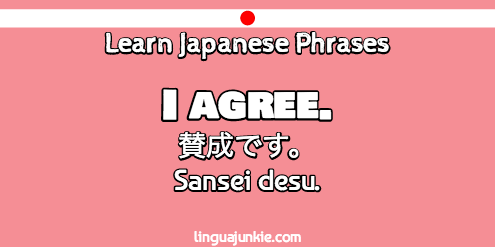
2) Absolutely.
- 全くその通り。
- Mattaku sono tōri.
“Mattaku” means completely and remember this word. You’ll see it in other contexts. After it, “sono tōri” means “exactly” or just like that. So, mattaku is there to amplify your agreement.
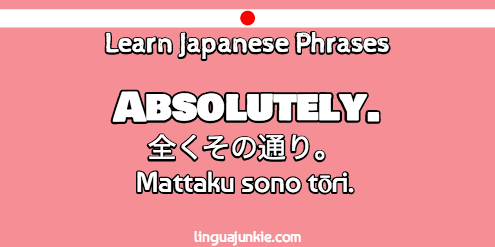
3) Exactly.
- その通りです。
- Sono tōri desu.
And that’s right, you can dump the “mattaku” and just say “Sono tōri desu.” Literally, “sono” means “that” and “tōri” means road and way. As if to say that your partner is on the right road or track and you agree with them.
Common way to express I agree in Japanese, or express agreement in general.
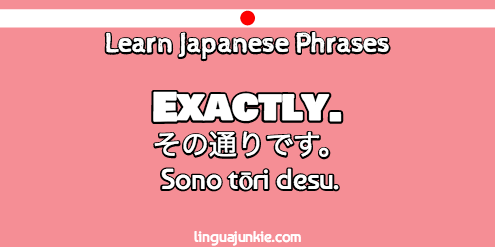
4) That’s exactly how I feel/think.
- 私も同じ考えです。
- Watashi mo onaji kangae desu.
This can be interpreted as feel or think as both are used interchangeably. However, “kangae” means “thought” or “view” so literally, you say “I think the same” or “I have the same thought.” If you’re wondering why I have these variations and slight nuances, that’s because Japanese is not directly translatable to English.
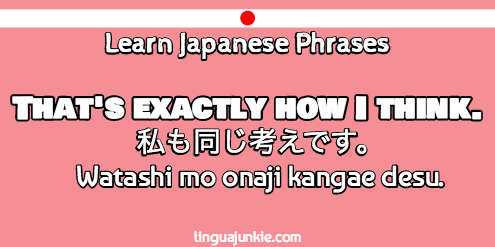
5) That’s true.
- 確かにそうですね。
- Tashika ni sō desu ne.
This is a VERY common phrase in conversations. You can even just say “tashika ni” which means certainly or surely. Please remember this one as you will hear it a lot.
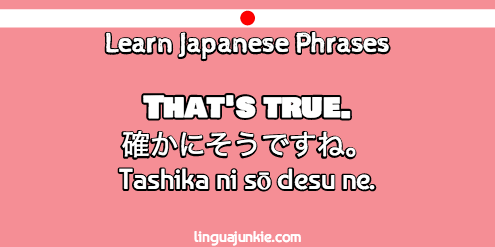
6) Of course.
- もちろんです。
- Mochiron desu.
Another common phrase that every beginner should know – “mochiron” meaning “of course.” You’ll hear this too.
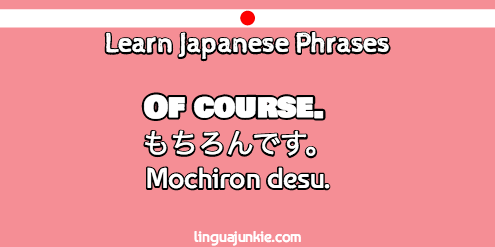
7) You have a point there.
- それは一理あると思います。
- Sore wa ichiri aru to omoimasu.
People don’t like agreeing if they hold a different opinion. So, if you’re one of those smart people that can spot a good point when you’re wrong, this is the phrase for you.
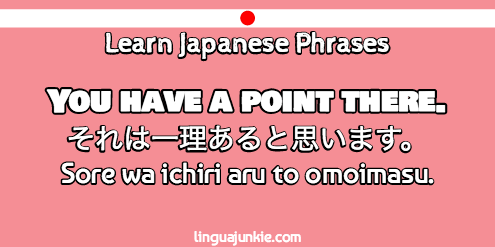
8) No doubt about it.
- 間違いありません。
- Machigai arimasen.
“Machigai” means “mistake” so this quite literally means “no mistake.” So you’re agreeing in Japanese by telling them that there’s no mistake in what they say.
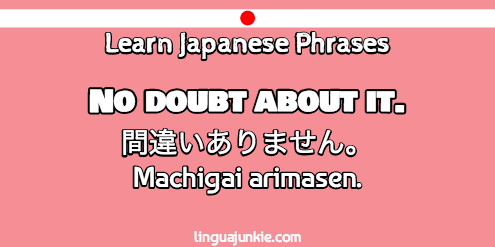
9) Maybe.
- 多分ね。
- Tabun ne.
Granted this is a very safe and weak answer in terms of agreeing in Japanese. Either you’re not sure… or quite honestly, it can be used as sarcasm or as an insincere response. That however, depends on the tone.
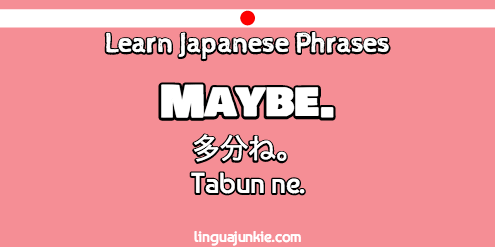
10) I think so, too.
- 私もそう思います。
- Watashi mo sou omoimasu.
This is the easiest way to say I agree in Japanese.
VERY common phrase. If you know enough Japanese, then you know that “omou” or “omoimasu” means to think. So, this is a literal translation of “I think so too.”
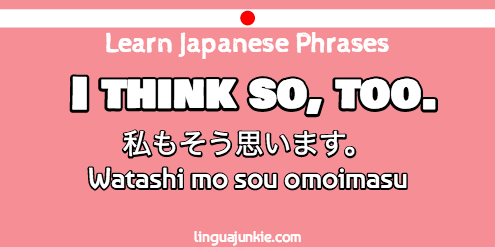
11) I agree.
- 同じ意見です。
- Onaji iken desu.
Another way how to agree in Japanese. The expression is a bit different though. “Onaji” means “same” and “iken” means “opinion.” You’re saying you have the same opinion.
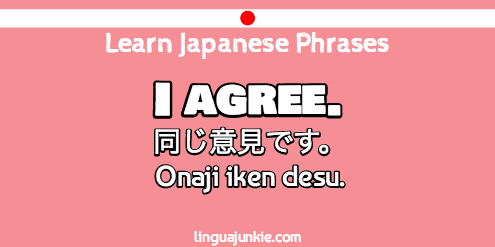
12) I guess so.
- そういうことだと思う。
- Sou iu koto da to omou.
Another way to agree. Common in conversation. And, as you can tell, a really weak statement. Either you don’t really agree, don’t really know (totally OK not to know things), or just are scared to say otherwise.
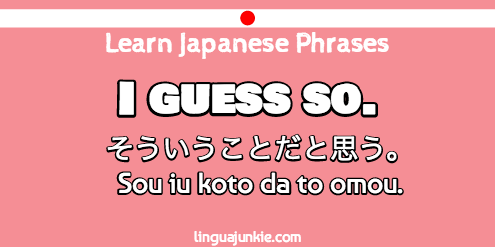
13) I suppose so.
- そうなんだろうね。
- Sou nan darou ne.
This is another variation of the above. “Darou” is a more casual, and slightly ruder version of “Desu.” So, be careful and use it in casual conversations.
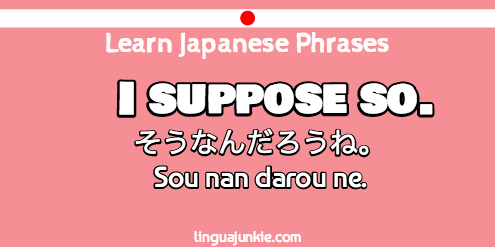
14) You may be right.
- あなたが正しいかもしれない。
- Anata ga tadashii kamoshirenai.
Either you’re not sure if they’re right… or if they’re right and you don’t want to REALLY admit it, this is a good phrase to have. “Tadashii” means “correct” and “kamoshirenai” is “perhaps” or “may be.”
15) That’s probably right.
- それが多分正しいのだろう。
- Sore ga tabun tadashii no darou.
Similar to the phrase above, except here, we’re talking about the statement that’s implied by “That’s” or “Sore.” Again, since this uses “darou,” it should be used in casual situations.
16) I couldn’t agree more.
- 大賛成です。
- Daisansei desu.
Remember “Sansei” from the beginning of this lesson? Well, add a “dai,” meaning “BIG” and you’re in MASSIVE agreement. “Daisansei” means complete agreement.
When you’re in complete, undeniable, 100% agreement. Another way to interpret this is as “I’m all for that.” Another way to say this would be the following below.
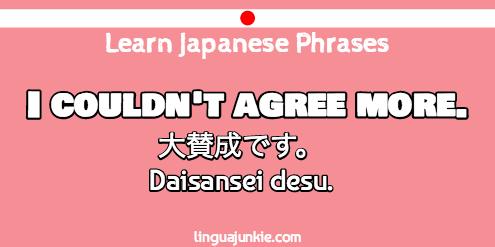
- 全く同感です。
- Mattaku dōkan desu.
“Dōkan” means “agreement” or same opinion, if you didn’t know.
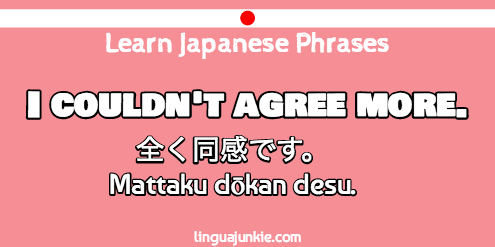
17) It might be possible.
- できるかもしれないね。
- Dekiru kamoshirenai ne.
Not a complete agreement but, hey, doesn’t hurt to know.
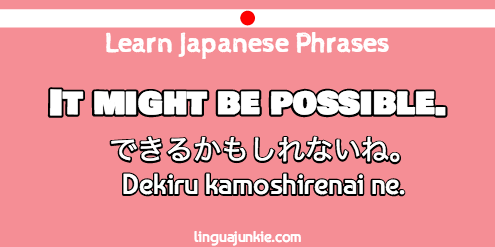
18) That’s all right with me.
- 私は、それでいいですよ。
- Watashi wa, sore de ii desu yo.
Sometimes, you just don’t care. Just another golden phrase on how to agree in Japanese. You can also omit “watashi wa” to be more casual. In Japanese, omitting yourself is perfectly fine from the sentence.
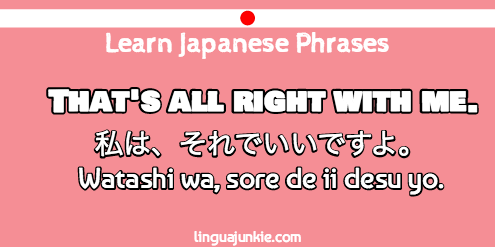
19) Yes, you’re right, I think.
- はい、正しいと思います。
- Hai, tadashii to omoimasu.
Just directly telling someone that they’re correct. You can choose to keep or omit “to omoimasu,” meaning “i think,” but that’s up to how you want to express yourself.
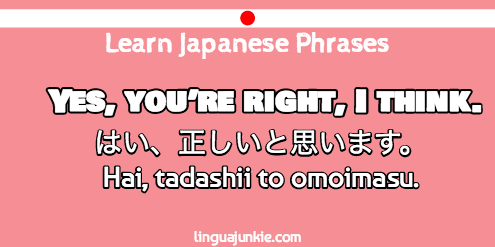
20) Sounds good!
- それは、いいね!
- Sore wa, ii ne!
Literally means “that’s good!” or “that’s awesome!,” however, in the proper context, YES you can use this to agree in Japanese. For example if someone asks you to go eat a burger with them, you can say “それは、いいね!”
I hear people use this a lot as a way to say I agree in Japanese.

21) If you insist/If you say so.
- あなたが、そこまで言うなら。
- Anata ga, soko made iu nara.
Well, this is not REALLY 100% agreeing. It’s how to agree in Japanese reluctantly. Usually, in this case, you’re too tired to argue or just want to let the other person have it their way. Also, this is fairly casual, so please use it with friends.
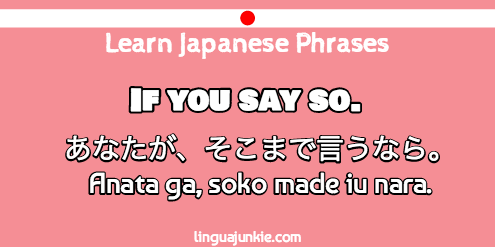
22) It’s up to you.
- あなた次第です。
- Anata shidai desu.
Now, you’re not really agreeing. You’ve given up. “Shidai” means “dependent upon,” so you’re letting them have the last word…and in a way, agreeing by letting them have their way.
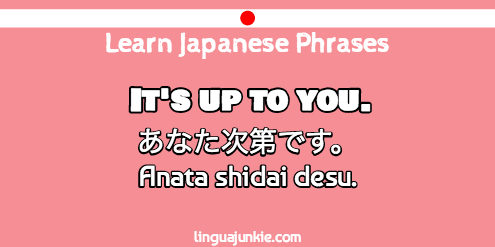
So, why the HELL do you need 22 ways to say – I agree in Japanese?(…there are more) Well, it makes you a more FLUID speaker. You already use these kind of variations in English without thinking about it. Japanese is the same way.
If you want to sound like a great speaker, you need to know tons of variations. You sound smarter. You have a wider range of expression as opposed to the one guy that only knows how to say “I agree” all the time.
Let me know what you think. Do you want more phrases?
Be sure to review this lesson on how to agree in Japanese and leave a comment.
Other lessons you will absolutely love:
- How to Learn Japanese in 5 Minutes (Study Tools Inside)
- Successful Learning: How To Self Study Japanese Alone.
– The Main Junkie
P.S. I highly recommend this for Japanese learners. If you REALLY want to learn to Japanese with effective lessons by real teachers – Sign up for free at JapanesePod101 (click here) and start learning!
[…] If someone makes a comment about the weather or surroundings, you could reply with a soudesune. This is a phrase that’s used to show that you’re listening to what the other person is saying. Essentially saying that you agree in Japanese. […]
this is very helpful. thank you so much
Hi,
I think there are mistakes in the kana and romaji of number 14.
expression in Japanese, or express agreement in general. Native Japanese, speakers was very good excellent at reading with notes useful phrases,.. JAPAN country government,.has friendly culture,.. sports, festival, social history studying?,..
when I chatted with my japanese friend and say その通りです, he said it’s wrong lol